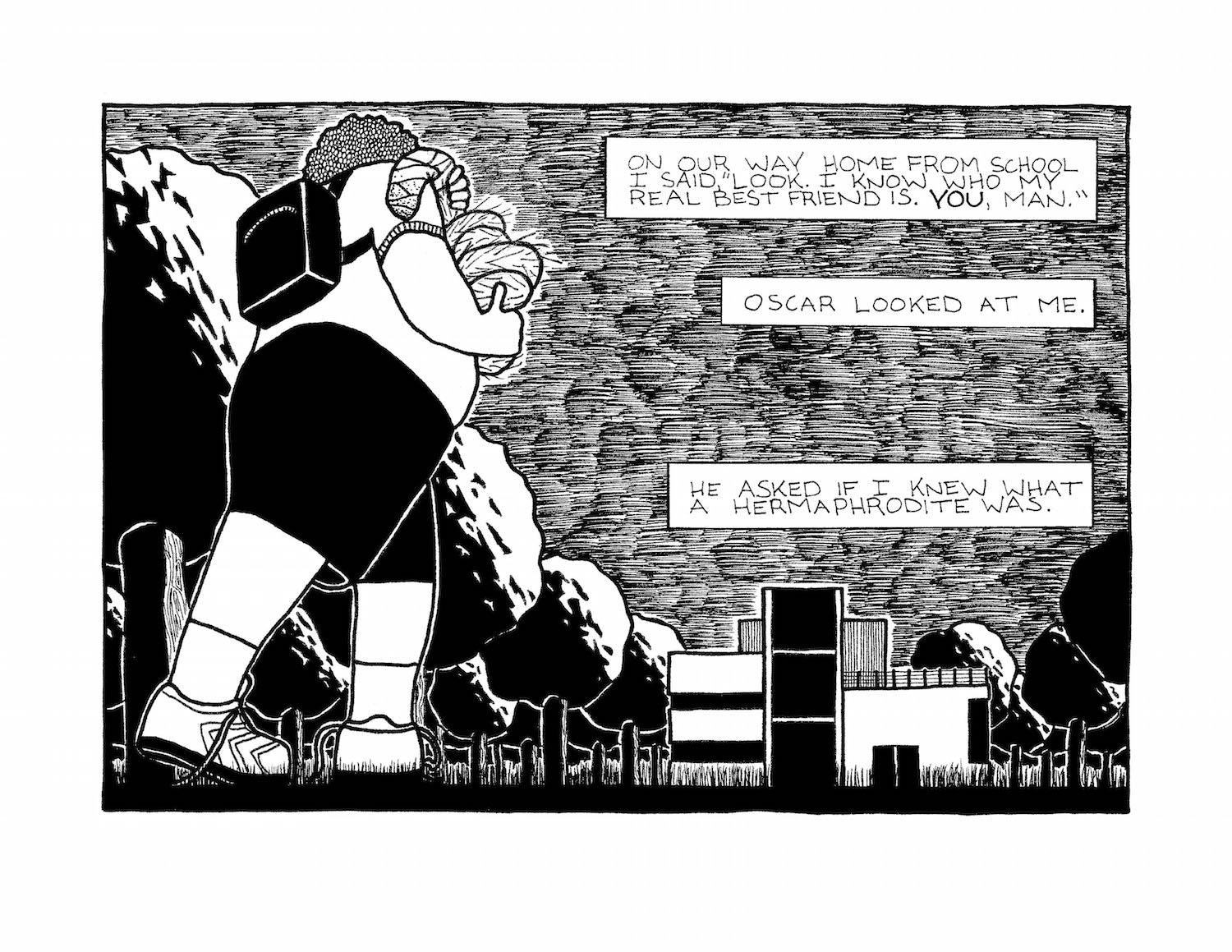Something wicked this way comes. Or, more accurately, something pleasingly twisted and macabre this day launches: Okey-Panky, the gnarled-root offshoot of literary journal Electric Literature, is a “weekly online magazine of short, darkly comic, ironic, and experimental fiction, essay, poetry, and graphic narrative.”
Edited by author and New Yorker contributor J. Robert Lennon and published every Monday, the new outlet promises to “confirm, at the start of each working week, your suspicion that life is strange, unfair, hilarious, and possibly meaningless,” according to a statement from Lennon. The inaugural issue consists of a comic by Simeon Mills (“The Bully”), a short story by Chris Offutt (“Bisbee”), an essay by Anne Gisleson (“The Rib Room”), and two poems by Heather Altfeld (“Sinkhole” and “The Drowning”).
This is super-neat and funny! You will think to yourself, scrolling through Mills’ sly portrayal of a young dweeb’s friendship with a hairy, jumbo-sized, lamprey-mawed worm. The dweeb also has his own bully, an impressive one, “captain of the boxing team, the cheerleading team, and the asphyxiation society,” himself hailing from an illustrious bully society operating out of an inner tube factory.
This is sick and messed-up! you will amend yourself, reaching the comic’s gleefully heinous conclusion, which is shocking both on an epidermal level and on the deep, hallucinogenic level of sexual symbolism. “Bisbee,” meanwhile, about a severe, weary-hearted waitress drawn to violent men, skewers “the naiveté of seeing life as fraught with promise” (though not entirely—for shattering your innocence, it sneaks in such lovely compensations as: “The unforeseen arrival of forgiveness relieved Lucy of a burden she didn’t know she carried, an invisible shawl of stone”). And Gisleson’s essay, about reading her dad’s obituary at the restaurant he frequented for more than a quarter-century, cheeringly concludes:
Apparently, it doesn’t matter who speaks for you after you’re gone, your tattoos or your tipsy children, nor whether you died alone at the bottom of an elevator shaft, anonymous in tunneling darkness, or surrounded by your family Uptown at Touro Infirmary under excellent care, you both end up side by side on page B-4 of the Metro section of the Times-Picayune on January 19, 2012.
As for the poems, they shed the kind of illumination that makes you wish for an office blackout. Love, for instance, is like disappearing into a sinkhole:
flailing and defenseless like impotent squid
who will be sucked forever into the bucket of the heart,
chopped and ringed and peppered with sadness
and flash-fried exactly as we were.
I reached out to Lennon with a few questions, which he was unable to answer until this evening because he had (truly!) been wandering down a country road in the snow, à la Frost, quite possibly contemplating the various appalling designs of darkness. Our written correspondence lies, like the drowned bodies condemned by Altfeld to “the watery hereafter,” below.
Slate: Why the name Okey-Panky?
Lennon: I came up with that by accident as part of a creative writing exercise, fake-translating some Russian into a short story. (It has since been published here in The Diagram, another quietly weird magazine!) My wife got a kick out the phrase and said we should use it for our long-contemplated litmag. We pitched the idea to EL and they were game. In a way, the name made the magazine happen.
Slate: Can you say more about the “darkly comic” sensibility you’re aiming for, and why it beckoned to you? (Did you just feel there is not enough evidence on the Internet that life is ultimately meaningless?)
Lennon: Oh, there’s plenty of meaninglessness out there! We just have always enjoyed, among other things, literature that isn’t trying to be anything other than itself. The loose-limbed fiction and poetry of the ’70s and ’80s is an inspiration. We want to publish work that wears its personality on its sleeve.
Slate: How do you feel launching another lit-mag into the Web’s huge sea of lit-mags? What sets this one apart?
Lennon: We’re not doing it to fill a niche, we’re doing it for the enjoyment of gathering things we like into one place. There’s nothing wrong with the other lit-mags, but they aren’t John’s and Rhian’s and Alice’s and Ed’s.
Slate: Can you provide a detailed visual/characterological description of your ideal reader?
Lennon: Well, if we could gather our ideal readership into, say, a cocktail party, the tallest woman in Scotland would have to be there. Also, a lot of birds in cages, quietly swearing. Somebody trying to sell balloons. A bunch of mayors. An allergist. An old lady in a wedding dress offering popcorn and eel roll from a tray. You know, people.
Slate: Could you discuss the yin and yang encapsulated in your two signature cocktails?
Lennon: We only asked him for one, but AJ, our house mixologist, made us two! The Okey-Panky is deceptively light and refreshing, but, as we found out at the launch party last week, it packs rather a wallop. The Hanky-Dokey is more for sitting by the fire in the evening, wondering why you spent the morning drinking Okey-Pankys.
